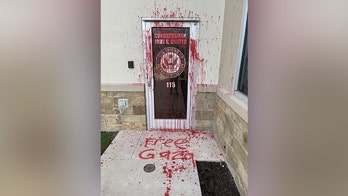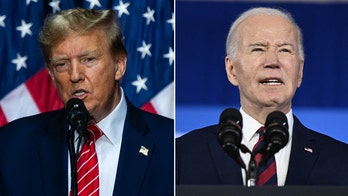Joe Biden urges Americans to help slow coronavirus, thanks supporters for primary success in Florida, Illinois
The choices we make as individuals will collectively make a big difference to the pandemic, says Democratic presidential candidate Joe Biden.
Joe Biden solidified his hold on the Democratic nomination, adding to his delegate lead with big wins in Florida, Illinois and Arizona.
JOE BIDEN CRUISES TO A TUESDAY SWEEP
The primary – like so much else in American life – was deeply affected by the ongoing coronavirus outbreak. The campaigns stopped holding events, the debate between Biden and Sanders was moved from Arizona to Washington, D.C., and Ohio canceled its election less than 24 hours before polls opened.
Fox News Voter Analysis surveys in each state highlighted the extent to which the pandemic was on Democratic primary voters’ minds as they headed to the polls: at least three-quarters of voters in each state were at least somewhat concerned they or someone in their family might contract the virus.
Concern about the virus was particularly pronounced among seniors in each state.
HERE'S HOW TO STOP THE CORONAVIRUS SPREAD
Democratic primary voters have said health care is the top issue facing the country in each contest surveyed to date, and that trend continued Tuesday. Nearly half cited health care as the top issue in Arizona and Florida, rivaling the record high set last week in Missouri (47 percent). In the primaries through Super Tuesday, the number of voters prioritizing health care tended to be in the mid-thirties.
Despite the recent reversal in the stock market, fewer than two-in-ten voters in each state called the economy the top issue, placing it just ahead of climate change in Florida and Illinois and in third place (behind climate change) in Arizona. In each state, it was far below health care on voters’ list of priorities.
At least seven-in-ten voters in each state favored changing to a single-payer health care system, a policy Sanders has championed, but even these voters backed Biden by double-digit margins in Florida (+32 percentage points) and Illinois (+16 points). Sanders won them – but only narrowly – in Arizona (+5 points).
Roughly nine-in-ten voters in each state favored moving to a public option health care system.
PRIMARY TRENDS
While concern about coronavirus has upended much of the primary in the past several days, the main trends and themes of the race stayed constant.
Democratic primary voters remained split between preferring a candidate who would restore the political system to the way it worked before Trump and a candidate who promised fundamental change. Biden won six-in-ten “restore” voters in Arizona and roughly eight-in-ten in Florida and Illinois. Sanders won “change” voters by a wide margin in Arizona, by a narrower spread in Illinois, and lost them in Florida.
Moreover, Biden continued to rely on strong support among older voters, African Americans, and political moderates. He also won suburban and rural voters in each state.
In the run-up to this week’s contests, Biden embraced Elizabeth Warren’s bankruptcy protection plan and endorsed free public college tuition for most families. Both moves were seen as attempts to appeal to younger voters. He won more than one-third of 18 to 29-year-olds in Florida and more than one-quarter in Illinois – better marks than he achieved in previous contests (except for those in southern states with large African American populations).
Latino voters were another key focus for Biden’s campaign. He won this group handily in Florida and received more than one-third of the Hispanic vote in Arizona and Illinois. His previous high-water mark among Latinos was 36 percent in Virginia.
While Biden was able to somewhat expand his coalition, support for Sanders continued to run almost exclusively with the groups who have supported him all along: voters under age 30, Latinos, and self-described “very liberal” voters. His lack of support among seniors (14 percent or less in each state) and black voters (18 percent in Florida and 23 percent in Illinois) proved too much of a liability to overcome.
Biden’s broader coalition meant that more voters would be satisfied if he were the eventual Democratic nominee: between 76 percent (Arizona) and 84 percent (Florida) would be satisfied with Biden; between 63 percent (Florida) and 68 percent (Arizona and Illinois) would be satisfied with Sanders.
Roughly nine-in-ten Democratic primary voters in each state said they would definitely or probably support Biden if he were the nominee. Sanders enjoyed similar support in Arizona (90 percent), but trailed Biden’s mark slightly in Illinois and Florida.
Biden and Sanders voters were equally likely to say they would back the other candidate if he won the nomination. This marks a change from earlier in the primary process when Sanders supporters were somewhat less likely to say they would support the eventual nominee.
Overall, more Democrats in each state felt Biden had a better chance against Trump in the fall.
Roughly eight-in-ten voters in each state were confident that the leadership of the Democratic Party represented their values – though Sanders supporters were more likely to express some skepticism on that front.
Similarly, about seven-in-ten voters in each state had confidence that the nomination process was fair – but roughly half of Sanders backers felt the process was unfair.
Florida had the most delegates up for grabs on Tuesday, and Biden won the state convincingly. Seniors made up more than one-third of the electorate, which provided him a major boost.
Latinos were also a source of strength for Biden in Florida, an important change for him after he struggled to win their votes in other states. Hispanics under age 45 split between Biden (43 percent) and Sanders (44 percent), while the former vice president won by 57 points among Latinos over 45 – giving Biden a comfortable win with this group overall.
Some of Sanders’ trouble in Florida may have been related to his praise for the accomplishments of Fidel Castro’s regime in Cuba. However, he did somewhat better with Cuban voters (losing 36-57 percent) than among Puerto Ricans (23-66 percent). Sanders also lost Hispanics from places besides Cuba and Puerto Rico (34-54 percent).
In a sign of Biden’s dominance, he and Sanders split the “very liberal” vote. Biden previously only won very liberal voters in Mississippi; beyond that, they were a core part of Sanders’ base. Despite being Jewish himself, Sanders was unable to earn significant support from Florida’s sizable Jewish population.
Florida will likely be a swing state in the November election. Democratic primary voters there thought Biden gave them the best chance against Trump. Twice as many thought Biden could definitely beat Trump (55 percent) than thought Sanders could (24 percent).
Arizona was Sanders’ best state, thanks in large part to the fact that many ballots were cast before the race shifted dramatically in the run-up to Super Tuesday. Sanders won handily among long-time supporters (57-32 percent), while those who made up their minds in the last month broke heavily for Biden.
Sanders won the Latino vote by an 8-point margin but was unable to win an outright majority among this key group. While Hispanic voters are a key source of strength for the Vermont senator, he has won less than 50 percent of the Latino vote in every state except California (exactly 50 percent).
Despite sharing a border with Mexico and the ongoing debate about President Trump’s proposed border wall, just 6 percent of Arizona Democratic primary voters cited immigration as the top issue facing the country. On immigration policy, almost twice as many opposed increasing security along the U.S.-Mexico border as favored it.
Hispanic primary voters opposed increasing border security by a narrower margin than (44 percent favor vs. 56 percent oppose) white voters (33 percent favor vs. 67 percent oppose).
When it comes to the general election, Arizona Democratic primary voters were more confident in Biden’s chances against Trump than Sanders’.
More results can be found here
Despite the fact that a record-high 68 percent of Illinois Democratic primary voters would be satisfied if Sanders were the nominee, Biden won the state by a massive margin. The former vice president ran up huge numbers among voters over age 45, moderates, and African Americans – and was particularly dominant among women over age 65.
Religious voters of every major denomination went for Biden, and he won the Jewish vote by a 41-point margin. Non-religious voters split much more evenly.
Even in the Land of Lincoln, Democratic primary voters split over paying reparations for slavery. Black voters overwhelmingly favored the idea, while six-in-ten white voters opposed it.
More results can be found here
METHODOLOGY
The Fox News Voter Analysis, conducted in partnership with the Associated Press, provides a comprehensive look at voting behavior, opinions and preferences as America votes. Surveys for the March 17 primary states were conducted in Arizona, Florida, and Illinois. The surveys were conducted by NORC at the University of Chicago the week before the primaries, concluding as polls closed. Interviews were conducted in English or Spanish. The surveys are based on interviews with a random sample of registered voters drawn from the state voter file. In Florida and Illinois, these probability sample results were supplemented by interviews with self-identified registered voters recruited from nonprobability online panels.
The sample sizes and margins of sampling error were 1,977 in Arizona (plus or minus 3.4 percentage points), 3,385 in Florida (plus or minus 3.0 percentage points), and 2,715 in Illinois (plus or minus 3.2 percentage points).
The data cited in this article may change slightly as additional votes are tabulated.





